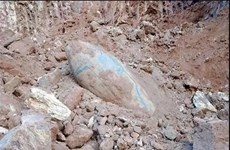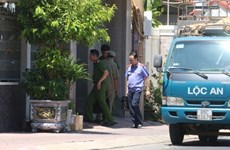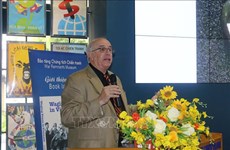Chol Chnam Thmay festivities held across Mekong Delta
The Khmer people across the Mekong Delta region, which is home to the
majority of the ethnic group, are celebrating their Chol Chnam Thmay New
Year festival, lasting from April 14-16.
The Khmer people across the Mekong Delta region, which is home to the
majority of the ethnic group, are celebrating their Chol Chnam Thmay New
Year festival, lasting from April 14-16.
On the first day of their New Year (April 14), they brought offerings to pagodas to welcome the new god of the year.
Thousands from the group in Can Tho city and Soc Trang and Tra Vinh provinces came to pagodas to pray for health and prosperity in the New Year.
They believe that every year heaven sends a god called Tevoda to earth to look after human beings and their lives. At the end of the year, the god returns to heaven and another one will replace him.
Thach Phach from the managing board of Luong Ba Sac pagoda in My Xuyen district, Soc Trang province, said over 6,000 families go to his pagoda every year to do the great calendar-receiving ceremony, which is to welcome the New Year and wait for omens of the new year.
On the second festive day, people heap up mountain-shaped stocks of rice at the main hall of pagodas to pray for a bumper harvest while sand will also be piled up in search for happiness and luck.
The third day is for the ceremony to wash the Buddha statue in order to pay tribute and gratitude to the Buddha.
During the three days, the Khmer people also make visits and offer each other wishes for good health, good luck and prosperity. They also join in fun activities.
Venerable Kim Thon, head of Chom-pay So phon pagoda in Chau Thanh district, Tra Vinh province, said this year, local Khmer people have a more joyful holiday since their well-being has been improved.
On this occasion, the Border Guards of An Giang province and the General Hospital of the province’s Chau Doc city on April 14 provided free check-ups and presented gifts to impoverished people in neighbouring Kompong Krosang commune of Cambodia – the country with most of its population being Khmer.
Chol Chnam Thmay is one of the most important festivals of the year for the Khmer people. It lasts three days (four days in leap years) and is usually held in pagodas.-VNA
On the first day of their New Year (April 14), they brought offerings to pagodas to welcome the new god of the year.
Thousands from the group in Can Tho city and Soc Trang and Tra Vinh provinces came to pagodas to pray for health and prosperity in the New Year.
They believe that every year heaven sends a god called Tevoda to earth to look after human beings and their lives. At the end of the year, the god returns to heaven and another one will replace him.
Thach Phach from the managing board of Luong Ba Sac pagoda in My Xuyen district, Soc Trang province, said over 6,000 families go to his pagoda every year to do the great calendar-receiving ceremony, which is to welcome the New Year and wait for omens of the new year.
On the second festive day, people heap up mountain-shaped stocks of rice at the main hall of pagodas to pray for a bumper harvest while sand will also be piled up in search for happiness and luck.
The third day is for the ceremony to wash the Buddha statue in order to pay tribute and gratitude to the Buddha.
During the three days, the Khmer people also make visits and offer each other wishes for good health, good luck and prosperity. They also join in fun activities.
Venerable Kim Thon, head of Chom-pay So phon pagoda in Chau Thanh district, Tra Vinh province, said this year, local Khmer people have a more joyful holiday since their well-being has been improved.
On this occasion, the Border Guards of An Giang province and the General Hospital of the province’s Chau Doc city on April 14 provided free check-ups and presented gifts to impoverished people in neighbouring Kompong Krosang commune of Cambodia – the country with most of its population being Khmer.
Chol Chnam Thmay is one of the most important festivals of the year for the Khmer people. It lasts three days (four days in leap years) and is usually held in pagodas.-VNA













